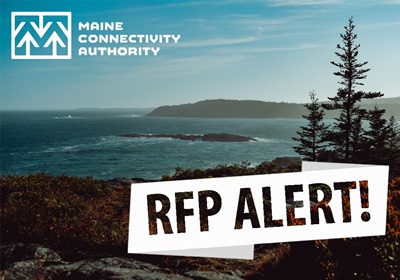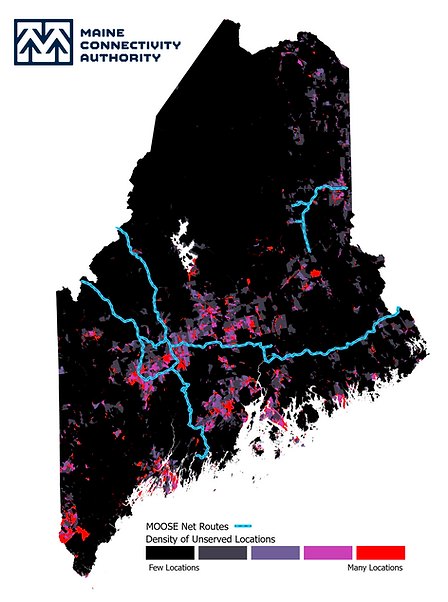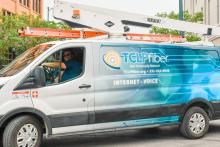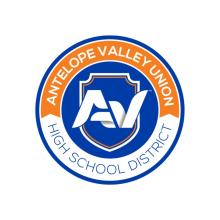
The Maine Connectivity Authority (MCA), Maine’s quasi-governmental public agency in charge of broadband expansion and digital equity, is seeking proposals to help design and construct a major 536-mile fiber network that should dramatically improve affordable fiber access across vast swaths of the Pine Tree State.
For several years Maine officials have proposed spending $53 million to build a major middle mile fiber network known as the Maine Online Optical Statewide Enabling Network (MOOSE Net).
The middle mile network would extend fiber into numerous underserved Maine communities, boosting broadband competition and access while hopefully lowering prices.
Last year, Maine received a $30 million grant to help fund the network’s construction, courtesy of the National Telecommunications Information Administration’s (NTIA) $980 million Enabling Middle Mile Broadband Infrastructure Program. The MCA’s proposal was one of just 32 proposals selected out of 260 applicants for federal broadband funding.

This month, the MCA announced that they’ve opened the request for proposal (RFP) process looking for experienced consultants, institutions, and firms capable of helping them design and build the massive new network. The full RFP indicates the finished network will be critical to supporting Maine’s remote industries like farming, forestry, fishing, enabling expanded cellular service, and underpinning climate adaptation needs.
The RFP also notes that the network will bring access to numerous regional anchor institutions, and go a long way in providing communications network reliability and reach in the face of an increasingly unstable climate.
The MCA says it has received nearly 30 letters of intent and expects the bidding process to be highly competitive. The RFP process closed on September 30 and partner selection will be completed by late October. Designs will be completed and presented to MCA in early 2025, and from that point construction is expected to take around two years to complete.
Monopolization And Market Failure
Like so many states, Maine is peppered by a handful of regional telecom monopolies that see little meaningful incentive to compete on speed, coverage, price, or customer service. As a result, countless Maine locals either can’t access broadband at all, or are subject to sluggish, patchy, expensive cable or DSL access.

Local telecom giants like Charter Communications (Spectrum) have a long history of not just underinvesting in local next-gen broadband access, but actively undermining efforts to boost competition. Such efforts are particularly harmful for more rural communities, which telecom giants both don’t want to serve–but often don’t want anybody else serving either.
Charter was most recently caught creating fake consumer groups to mislead locals about the benefits of community owned and operated broadband networks. Charter has also routinely lobbied for and ghost written unpopular, protectionist state bills attempting to prevent community broadband networks from being constructed, expanded, or adequately financed.
Maine consistently ranks at the bottom of the pack in terms of bridge condition, broadband affordability, reliable power infrastructure, and road quality. The state is ranked 49th in terms of the public’s access to gigabit fiber, and MCA data suggests 15 percent of the state lacks even basic Internet service, and only 24 percent have access to true 21st-century broadband Internet service at speeds of 100 megabit per second (Mbps) or greater.
Buoyed by an historic wave of federal funding, Maine’s broadband action plan, first constructed in 2020, hopes to significantly change that.

Big Changes Are Afoot
A lot of the broadband deployment progress made in Maine in recent years has come courtesy of municipal broadband projects – many of them originating on coastal and long neglected island communities – forced to take their lack of connectivity into their own hands. These “scrappy” efforts have inspired other, less logistically constrained Maine communities to follow suit.
The MCA remains at the center of those efforts. Since 2022, the organization says it has facilitated over $200 million of federal and state funding to help connect over 86,000 locations in Maine to affordable high-speed Internet.
The MCA’s Partnerships for Enabling Middle Mile Program (PEMM), buoyed heavily by COVID relief funds, has helped to address large-scale, regional broadband needs by leveraging middle mile infrastructure.
Those efforts have taken direct aim at the problems caused by private sector monopolization of essential broadband access.
“The private sector broadband investment model doesn’t work in rural Maine,” the state’s plan proclaims.
“The low population density and limited scale make it unprofitable for the private sector to expand their networks with private investment only. This persistent market failure is the driving force behind state, local and federal investments in high speed internet connectivity for rural areas.”
In the coming year, MCA will deploy an additional $270 million in funding through the BEAD (Broadband, Equity, Access, and Deployment) program and the Maine Jobs and Recovery Program, in turn made possible by the 2021 infrastructure law.
The potential reach of MOOSE Net would be transformative for the state. Once constructed, the network is expected to impact more than 131 Maine communities, including more than 11,000 unserved residents and local businesses.
MOOSE Net will also ultimately help connect more than 200 community anchor institutions, including local schools, hospitals, libraries, municipal operations, and community centers.
The network will also lower the costs of entry for new market entrants, private and municipal alike, looking to compete with major providers. That should, over time, help drive down costs, boost speeds, and incentivize local providers to improve what statistically has been some of the worst customer service of any industry in America.
“Amidst all of the tremendous work Maine is doing to connect everyone to a reliable high-speed internet, MOOSE Net represents one of the most profound ways we can prepare our digital infrastructure to support the growth and evolving needs of our communities,” said Andrew Butcher, president, Maine Connectivity Authority.
“Selecting the right partners to bring this vision to life is essential.”
The MCA expects to have more detail on the state’s transformative new state middle mile network sometime later this month.
Header image courtesy of Nate Huges, Attribution-NonCommercial-ShareAlike 4.0 International
Maine MOOSE Net map courtesy of Maine Connectivity Authority website
Inline image of MCA officials looking at fiber racks courtesy of Maine Connectivity Authority







